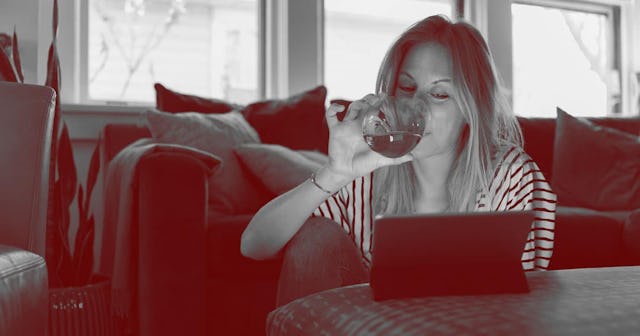Is Your Lockdown Drinking Normal? How To Recognize A Dependency

After the World Health Organization declared COVID-19 a global pandemic and before the public was officially told to stay at home as much as possible, people began panic shopping. Toilet paper disappeared off the shelves. Lysol wipes became all but impossible to find. We were all desperate for the groceries and supplies that would get us through two weeks of staying at home.
In the days before the lockdown was announced, before social distancing was a practice we had all begun, I sat beside a colleague and we discussed the supplies we were attempting to gather. She told me a story of a woman in line in front of her at the local Costco. While everyone else had boxes of snacks and pasta, this woman had eight bottles of wine. We both joked that this lady was doing it right.
Fast forward three months, and alcohol sales have skyrocketed by 243%. That lady in Costco, and almost everyone else I know, has dealt with pandemic stress by drinking more frequently—consuming more drinks and drinking earlier and earlier in the day.
Alcohol became a way to numb the unimaginably high stress we all felt when our normal routines were ripped away and the idea of tomorrow seemed impossibly hard to define. Alcohol became a part of pandemic life, as reflected in the number of memes being shared (my favorite was the one of the coffee mug handing the baton to the glass of red wine) and the number of virtual happy hours happening over Zoom.
But, if everyone’s drinking more, and everyone’s making it a joke, how does one recognize a dependence when lockdown drinking goes beyond the norm?
Scary Mommy spoke with Tim Ryan, a Recovery Advocate for Rehab.com, about how to recognize a dependence. His answer was stark and simple. If that drink becomes a compulsion or obsession, if that drink becomes the thing you plan your day around, then your funny lockdown habit has probably crossed the line into dependence. If you’re hiding the truth about that extra glass of wine or that bottle of vodka in the garage, your drinking has probably crossed the line. And if you’re forgetting to do the simple things—if your hygiene is slipping or you’re sleeping through your alarm too many days—because you’re constantly self-medicating, then your drinking has probably become a dependence.
The truth is, most people cannot recognize this dependence on their own. “Alcoholism is the only disease that will tell you you’re cured,” says Tim, who explains that someone dependent on alcohol will be able to rationalize away their actions. In Ryan’s experience, he very rarely gets a call from someone who needs help. Instead, “99% of the time it’s a loved one calling on behalf of a person afflicted,” he says. The one exception he’s found—the only time he’ll get a call from someone who needs help—is when that person has experienced enough pain: when they’ve gotten that DUI, when their significant other has walked out on them, when they’ve woken up in the middle of the afternoon to find the kids have torn the house apart.
Which is why checking in on your friends is so important right now, when the world is changing so fast. That friend might not admit how much they’re drinking, they might seem as if they’re just in on the pandemic alcohol joke with everyone else, but there are subtle signs and ways to read between the lines. First, trust your intuition. If something feels wrong, whether the person is slurring or not taking care of themselves as much as usual or simply making excuses that don’t quite fit, and your intuition begins to spark, trust that. Your friend might need help. And if your friend is avoiding you, returning calls with texts, or nothing at all, keep trying. There may be a cry for help there, too.
There are resources, even during a pandemic. Even during lockdown. Treatment centers are essential businesses, and they are open. Ryan recommends that the first step one should take when they notice a problem in their loved one is to check out rehab.com. There are 35,000 treatment centers in the country, and they are not one size fits all. Anyone can go to that site, fill out a questionnaire and receive at least three resources. There are even options available for families who have limited resources or who have lost health insurance and/or can’t afford COBRA payments.
We live in a culture in which, even before the pandemic, drinking alcohol was glamorized. It’s so glamorized that we often forget that alcohol can be dangerous. Not only because it impairs your judgment, but because when you’ve crossed that line into dependence, withdrawal without proper medical detox can cause seizures, and can kill you.
Chances are that we, as a society, will be living with residual pandemic stress for a while. The world is changing, both to reflect the realities of a virus and in ways that are long overdue, and we should all have mechanisms in place to deal with that stress, besides alcohol. Routines help—Ryan suggests getting back to your pre-COVID-19 routine as much as possible. He also encourages everyone to spend time outside or at least take a few minutes to be calm, to stop living on social media—one or two check-ins a day should keep you informed, but not captive—and to cut toxic people out of your life.
His final advice is this: ask for help. It’s the hardest thing to do, but it could make all the difference.
This article was originally published on